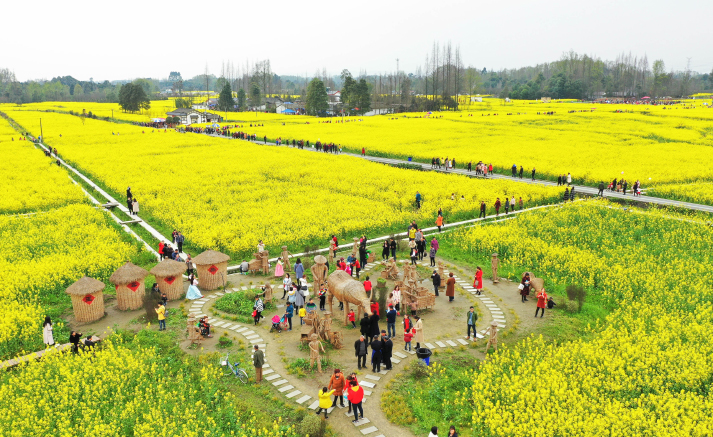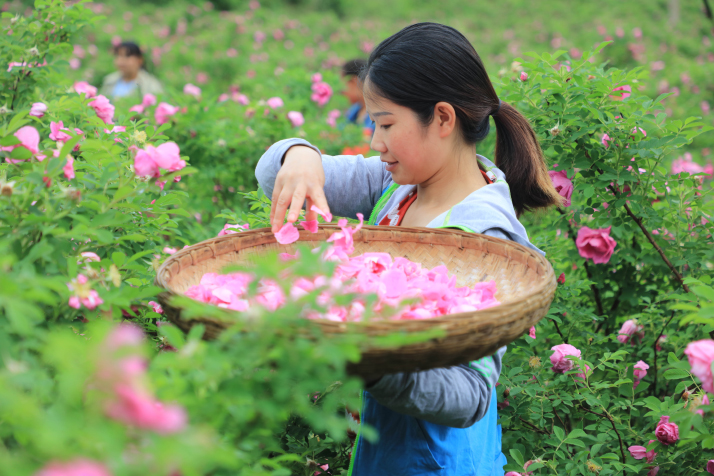| Business |
| Fruits of Labor | |
| Joint efforts contribute to the increase of farmers' income | |
|
|
 Urban residents visit a rape flower farmland in a village of Dujiangyan, southwest China's Sichuan Province, on April 26 (XINHUA)
In 2015, a large-scale kiwi farm was established in Xincheng Town of Jinggangshan City, east China's Jiangxi Province as part of the town's land transfer experiment. The city was an old revolutionary and traditional poverty-stricken area with local farmers leaving the villages and working in cities as migrant workers. Four years later, the farm has borne fruit. Through transferring their land use rights to producers and participating in the production, not only have local farmers come to earn an additional income, but it has attracted the migrant workers coming back home to participate. "Farmers are now more passionate and responsible for their work," said Yang Zhaoping, head of Xincheng Town. Transferred incentives The construction of modern farms and agricultural industrial parks provides more opportunities for rural employment and injects impetus for poverty alleviation, raising the incomes of local residents. At a press conference held by Ministry of Agriculture and Rural Affairs (MOA) on April 23, Wei Baigang, Director General of the ministry's Development and Planning Department, said in the first quarter, the agricultural product processing industry developed steadily. It is estimated that the operating income of the industry above designated size will reach 3.4 trillion yuan ($502 billion) in the first three months, with a year-on-year increase of 3.6 percent. Online transaction of agricultural products contributed to the boost in the revenue. According to the data provided by Taobao, an e-commerce platform, food sales in the first quarter increased by 16.8 percent. Thanks to the good health of the rural economy, the per-capita disposable income of rural residents reached 14,617 yuan ($2,173) in 2018, a growth rate of 6.6 percent, 1 percentage point higher than that of urban residents for nine consecutive years. With expanding imports of agricultural products, how to increase farmers' income becomes a pressing issue. Bi Meijia, Head of the Chinese Society for Management on Rural Cooperative Economy, noted that traditional income streams such as farming and rearing livestock are declining while new ways to income improvement are emerging. A new generation of migrant workers is providing housemaid services and account for over 90 percent of delivery drivers. Land appreciation income and dividends on rural collective assets become an important source of farmers' property income. In rural areas, agriculture experiencing and tourism projects are adding fresh impetus to the new economy. Xiabao Village in Liangshan Town of Jiangxi Province becomes a hot tourist destination. In April, golden rape flowers extend for more than 100 hectares. Villagers built a scenic spot based on the original landscape to develop the industry of rural tourism. With nearly 20 scenic spots including cultural exhibitions and forestry parks, Xiabao Village brings 30,000 visitors every year, with annual profits of 5 million yuan ($743,140). An integrated pattern of development—a combination of agriculture, culture and tourism—has been harnessed according to local conditions, which have successfully increased farmers' income.  Villagers pick roses in a village of Bijie City, southwest China's Guizhou Province, on April 30 (XINHUA)
Learning new skills In the new era when new skills are needed for more complex jobs, some farmers have found difficulty in landing a job in the cities. Yang Zhiming, President of the China Association for Labor Studies, said it was caused by a lack of training. To meet the urgent need of trained migrant workers, the Ministry of Human Resources and Social Security drafted a plan for upgrading the skills of migrant workers in 2014. Four years later, 11 million farmers and senior technicians were available nationwide. The role of private institutions in the training of farmers should be emphasized, which was previously dominated by the government, and the influence of small and medium-sized enterprises should be enhanced. A lot of mechanisms have been explored and platforms have been built to connect enterprises and rural migrant workers in recent years. Wu Xiaojun, head of a human resources service company, said the company has created an Internet platform to connect enterprises and migrant workers. The platform can classify registered users according to their specific skills before recommending or systematically matching them to potential employers. When farmers finish required work, employers can pay them directly through the platform. Both sides can evaluate the other based on their performance. Ke Bingsheng, former President of China Agricultural University, believes that the education level of farmers and migrant workers is an important factor affecting income. At present, only 26 percent of migrant workers have attended high school or above, while 14 percent only have primary education. He said that as the complexity of new jobs in both rural and urban areas has increased, so have employment requirements. Therefore, coordinated development of compulsory education in urban and rural areas is indispensable, together with vocational training in new agriculture. In recent years, an increasing number of graduates from renowned universities have started agricultural businesses in the countryside. Chen Sheng and Lu Buxuan are two prominent figures who graduated from Peking University but are engaged in the business of raising pigs and selling pork—nothing close to their majors of economics and literature at school. Though criticism that it is a waste of valuable educational resources exists, their efforts brought a much-needed intellectual boost to the agricultural sector. There are currently 7.8 million people starting a business in their home villages. More migrant workers, graduates from colleges and veterans are encouraged to do so in the future. The MOA has vowed to provide a sound environment for innovation and entrepreneurship at the press conference. Copyedited by Craig Crowther Comments to liqing@bjreview.com |
|
||||||||||||||||||||||||||||
|
